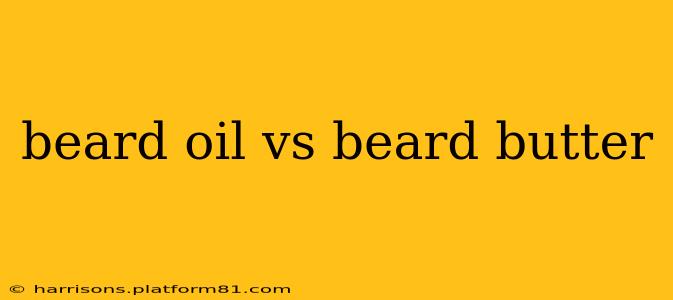Choosing between beard oil and beard butter can feel overwhelming, especially with the sheer number of products on the market. Both aim to soften and condition your beard, but they differ significantly in their composition and effects. Understanding these differences is key to selecting the best product for your specific beard type and needs. This comprehensive guide will break down the key distinctions, helping you make an informed decision.
What is Beard Oil?
Beard oil is a lightweight, fast-absorbing product typically composed of carrier oils (like jojoba, argan, or grapeseed oil) and essential oils for fragrance and added benefits. The carrier oils penetrate the skin beneath the beard, moisturizing the skin and promoting healthy beard growth. Essential oils provide additional benefits like soothing irritation or stimulating hair follicles.
Benefits of Beard Oil:
- Lightweight and Non-Greasy: Beard oil feels light on the skin and doesn't leave a heavy residue. This makes it ideal for everyday use, especially during warmer months.
- Deep Conditioning: The carrier oils nourish the skin and hair follicles, promoting healthy beard growth and preventing dryness and itchiness.
- Softens and Detangles: Beard oil helps to soften coarse beard hair, making it easier to style and manage. It also helps to detangle unruly hairs, reducing breakage.
- Improved Skin Health: It hydrates the skin underneath the beard, preventing dryness, flaking, and irritation.
What is Beard Butter?
Beard butter is a thicker, richer product that combines oils with butters like shea butter, mango butter, or cocoa butter. These butters provide a heavier moisturizing effect, making them ideal for dry, coarse, or long beards. Beard butter often includes additional ingredients like beeswax for hold and conditioning agents.
Benefits of Beard Butter:
- Intense Hydration: The rich butter content provides deep, long-lasting hydration, perfect for dry or coarse beards.
- Increased Conditioning: Beard butter offers superior conditioning, leaving the beard softer and more manageable.
- Style and Hold: The addition of beeswax or similar ingredients provides a degree of hold, helping to style and shape the beard.
- Protection: The thicker consistency creates a barrier, protecting the beard from environmental stressors like wind and cold.
Beard Oil vs. Beard Butter: A Detailed Comparison
| Feature | Beard Oil | Beard Butter |
|---|---|---|
| Consistency | Lightweight, liquid | Thick, creamy |
| Absorption | Fast | Slower |
| Hydration | Moderate | Intense |
| Conditioning | Good | Excellent |
| Hold | Minimal | Moderate to High |
| Best for | Everyday use, shorter beards | Dry, coarse, or long beards |
| Season | Warmer months | Any season, especially colder months |
What's the Best Option for You?
The best choice depends on your individual needs:
- Short, fine beards: Beard oil is likely sufficient.
- Long, coarse, or dry beards: Beard butter will offer more intense hydration and conditioning.
- Beards prone to itchiness: Both can help, but beard oil's lighter consistency might be preferable for everyday use.
- Beards needing styling: Beard butter provides more hold.
Many men find it beneficial to use both products – beard oil for daily moisturizing and beard butter for deeper conditioning and styling. Experiment to find the perfect combination for your beard.
Can I Use Beard Oil and Beard Butter Together?
Yes, absolutely! Many beard enthusiasts find using both oil and butter incredibly beneficial. Typically, apply the oil first to allow it to penetrate the skin and beard hair. Follow with the butter for added conditioning and hold. This layering approach ensures maximum hydration and conditioning.
What are the common ingredients in beard oils and butters?
Beard Oils: Common carrier oils include jojoba oil, argan oil, grapeseed oil, almond oil, and avocado oil. Essential oils like tea tree oil, cedarwood oil, and sandalwood oil are often added for fragrance and therapeutic benefits.
Beard Butters: Common butters include shea butter, mango butter, cocoa butter, and kokum butter. Beeswax is frequently added for hold and texture. Similar carrier oils as in beard oils might also be included.
Are beard oils and butters suitable for all skin types?
While generally safe, it's crucial to perform a patch test before applying any new beard product to your entire beard and face. If you have sensitive skin, opt for products with minimal essential oils or fragrances. If you experience irritation, discontinue use and consult a dermatologist.
By understanding the differences between beard oil and beard butter, you can choose the right product to keep your beard healthy, soft, and looking its best. Remember, the best approach might involve using both for a comprehensive beard care routine.
